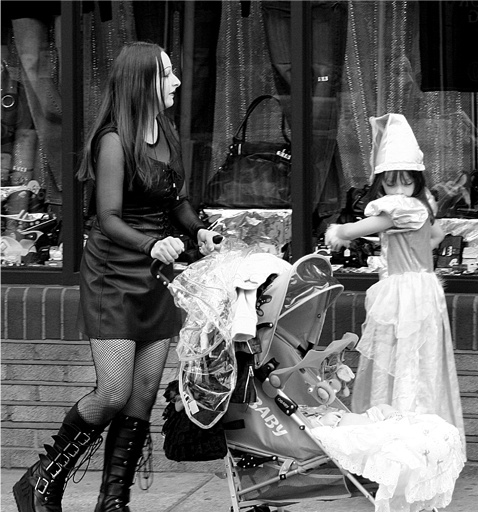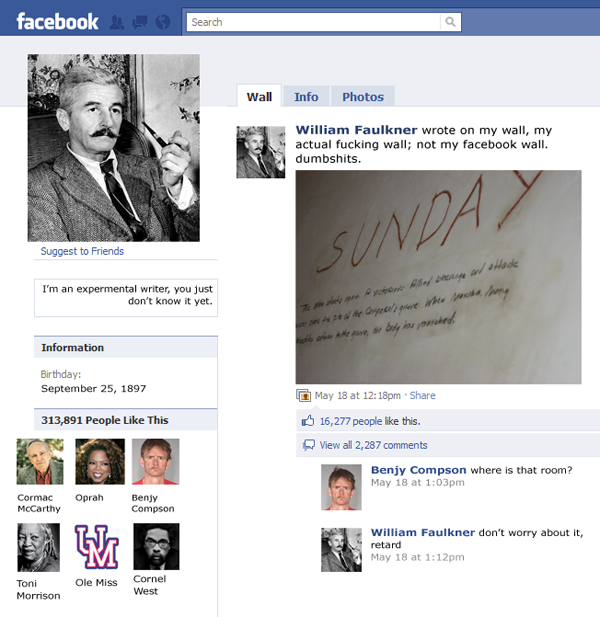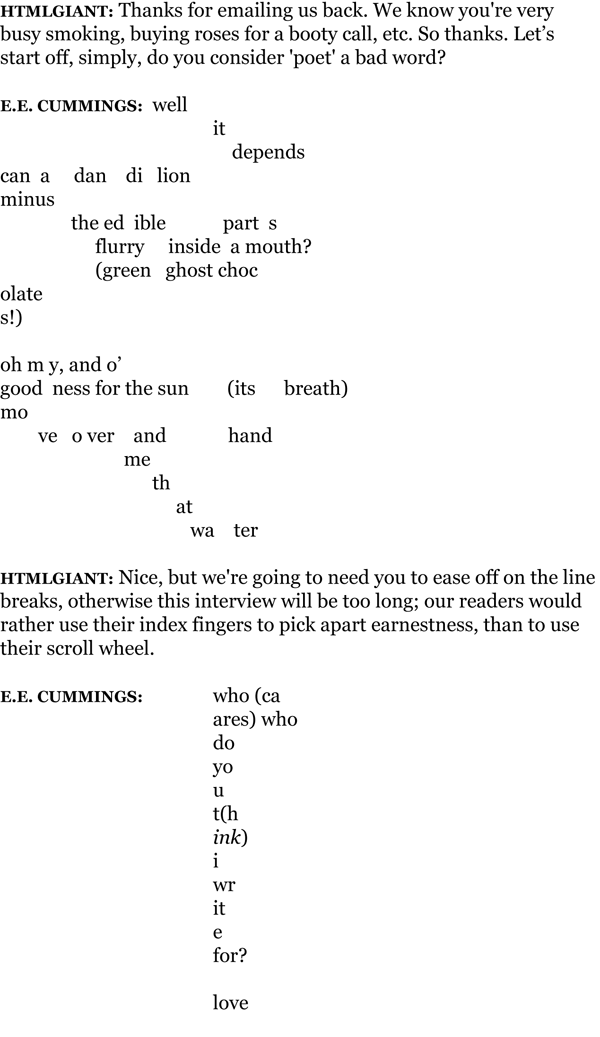Cami Park
I am very blue to learn this afternoon of Cami Park’s passing. Cami lived in Nevada, and she was a sly and observant writer, someone whose work knew the world tenderly and could—as Scott Garson put it—”wake you up where you sleep.” Cami was also a generous and delightful person to correspond with. Read some of her work at Fictionaut, Necessary Fiction, Night Train, PANK, and No Tell Motel. Her blog can be found here. I am sad to have never met Cami Park in person to tell her how much I enjoyed her writing. Her story “Everyone the Same But Not At Once” appeared in NOÖ [11], and I’ve excerpted it below the jump. Cami’s words will live on and around in these windows of ours. She will be missed. READ MORE >
Jonathan Safran Foer Police Report

Jonathan Safran Foer, police photo
Slavoj Žižek’s Metaphorical Symphony
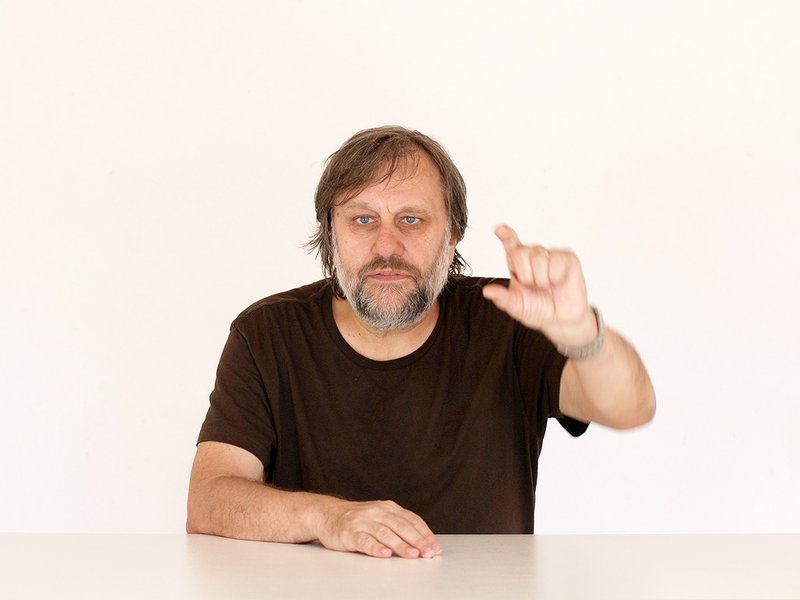
You see this here? This is the world’s smallest cello playing playing the saddest song just for you. I’m a Marxist, and the State stopped making violins in 1910, so we only have cellos now — is that okay, huh, you capitalist pig? I learned this “smallest violin” expression in Barnes & Noble circa 2007, after noticing they shelved Slavoj Zizek Presents Leon Trotsky: Terrorism and Communism under Trotsky instead of me. I started bitching in some incomprehensible foreign accent and my friend was like “Dude, I’m playing the smallest violin just for you,” while rubbing his fingers together as if in effort to stimulate some long lost clitoris down the block. But enough about feminism.
77 interviews and now you people be happy goddamn you etc 14
5. Some MFA fuck will host the Oscars.
77. In other sad news:
14. Flash Fiction interviews Nicolle Elizabeth. I thank them.
My favorite part of it is that it isn’t getting another print run. Can I say that?
111. Kyle Hemmings interview at Dark Sky Magazine.
One of the biggest influences, besides other writers, was the nine or ten years I spent on the streets of New York, when I became addicted to the club scene.
1. Me here. My father brings novels to family reunions, funerals, and weddings. They are secreted in large pockets of his jacket. He brings them out, he reads them during the various proceedings. People have said things. But is this so wrong?
It is Friday: Go dye a sled
I became insane, with long intervals of horrible sanity.
Try a smirk that is not a smirk.
Nothing shall turn me.
What will happen to our odd photos now? We delete them. We delete them. We delete ourselves.
Drunk like house keys handed over to a youngest son.
Of word-play it has been said that those who most dislike them are those who are least able to utter them.
The nose of a mob is its imagination.
Golden bells! Brass rings!
There is an eloquence in true enthusiasm.
Sleep is a slice of death. I hate it.
Drunk as a famous photo.
Look. Convince yourself not to convince.
I Knew That There Was Nothing Beyond It: An Interview with Ben Spivey
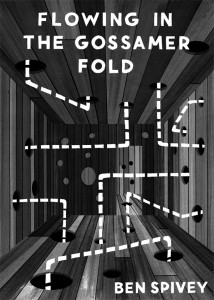 Earlier this summer, Blue Square Press released their first title, Ben Spivey’s Flowing in the Gossamer Fold. Told in a series of mostly short, alternatingly Lutz-real and dreamlike passages, the book contains an interior logic and realm of imagery somewhere on the cusp of no realm, fresh and familiar at the same time. Over the past week or so, I asked Ben about the book’s creation, his influence, and more about the future of this new press over email.
Earlier this summer, Blue Square Press released their first title, Ben Spivey’s Flowing in the Gossamer Fold. Told in a series of mostly short, alternatingly Lutz-real and dreamlike passages, the book contains an interior logic and realm of imagery somewhere on the cusp of no realm, fresh and familiar at the same time. Over the past week or so, I asked Ben about the book’s creation, his influence, and more about the future of this new press over email.
Let’s start at the beginning: How did Gossamer begin in you as an idea?
It began as a drowning feeling. When I was first thinking about Gossamer I knew I wanted to tell a story about a man losing everything he was comfortable with. I knew how I wanted it to end, in fact I had the last sentence written in the first draft, the line was never changed.
So your writing the novel was all movement toward that last sentence? How did the moves reveal themselves? Over what time?
I started writing the novel in February of 2009 and I finished it sometime around March of this year. The moves revealed themselves as pieces to a puzzle. I kept a Moleskine journal with me at all times, jotting down ideas. For that year I never stopped thinking about Malcolm. A lot of the time I put into the novel was spent arranging the scenes and the moments, moving and cutting chapters, paragraphs, sentences. The beginning was originally the middle. I was working toward that last sentence; I knew that there was nothing beyond it.
November 17th, 2010 / 2:08 pm


